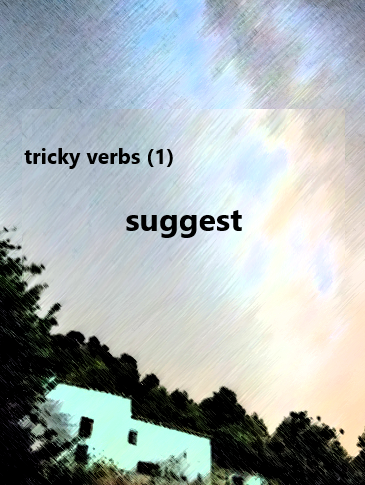Tricky verbs 1 suggest
There are more tricky verbs (in comparison with other languages) that
will be dealt with here regularly
A) Meaning, examples and comparison with
Spanish
1) to mention or
introduce (an idea, proposition, plan, etc) for consideration or possible
action:
Let’s take into
account two possibilities:
a) John suggests an
action; an action that John himself and somebody else will perform.
b) John suggests an action; an action that somebody else, or a group (John not included), will perform.
a) First case,
first example
John would say: “Why don’t we all go to the beach for a swim?” or
John will go the beach with everybody, so that somebody
reporting his suggestion will say:
John suggested going to the beach for a swim
Same case,
different example:
The ringleader says: “Why don’t we
break in through the back door” or
“Let
us break in through the back door”
The ringleader will break in with the rest of the gang, so that if one of
them reports it will say:
The ringleader suggested breaking in through
the back door
The ringleader will break into the house together with his accomplices.
STRUCTURE
a) = Subject + SUGGEST + ING CLAUSE
b) John suggests
an action but he will not take part in it:
John
would say: “I’m tired. Why don’t you people jump the fence and
get the ball?”
In this case John will not jump the fence, so somebody who reports it
will say:
John suggested that we (should) jump the
fence and get the ball.
STRUCTURE b) two possibilities
Possibility 1:
Subject + SUGGEST + that-clause with should
Possibility
2: Subject + SUGGEST + that-clause with infinitive without to (more formal)
Possibility 1
John suggested that his sister should be
there waiting for him.
Possibility 2
John suggested that his sister be
there waiting for him.
(Yes:
the third person takes no “s” in this case)
Comparing Structures for Spanish Speakers
2) When we refer to
facts, though, the indicative is used, even when the subject is an object
The glove suggests that she was at the
scene of the crime.
His smile suggested that in spite of his
wife’s death he was the happiest of men.
The inspector suggests the crime was
committed after midnight
*
B) Exercises
Report the following sentences using the verb “suggest”. Do it aloud,
even if alone; record yourself –use your cellular; write only as a memory
technique. The examples are set in three groups: structure a), structure b) and
mixed. Remember the goal of this exercise is not to see how much you know but
that you make up your own examples and produce them orally.
The sentences given do not always have the same meaning as “suggest” but
they can be useful for this practice.
STRUCTURE a)
1.
“Why don’t we buy it at the station? It’s cheaper”.
2.
“I’d better stay here till they come”.
3.
“Let’s drive in turns, and we’ll make it there in
the morning”.
4.
“Why don’t we all go through that window and give
him a fright?”
5.
“Let’s buy some more. It’s a whole family coming
now”.
STRUCTURE b)
1.
“Let me advise you to close all the windows and
shutters before the wind sets in”.
2.
“Why don’t you do it yourself instead of complaining
all the time”.
3.
“He advised me to go along the river, as it is a
shortcut”.
4.
“Why don’t you people ignore his comments
altogether?”
5.
“I wouldn’t swim across. The water’s too cold”
MIXED A) &
b)
1.
“If I were you I wouldn’t tell the police a word of
what you’ve seen here”.
2.
“Let’s go out for dinner and then to the theatre”.
3.
“Let’s not argue one more minute”.
4.
“Why don’t you join the army?”
5.
“You might as well say nothing about it”.
*
* *





Comentarios
Publicar un comentario